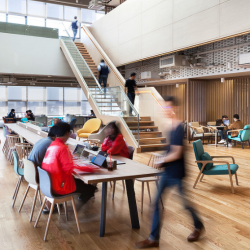To provide the best experiences, we use technologies like cookies to store and/or access device information. Consenting to these technologies will allow us to process data such as browsing behaviour or unique IDs on this site. Not consenting or withdrawing consent, may adversely affect certain features and functions.
The technical storage or access is strictly necessary for the legitimate purpose of enabling the use of a specific service explicitly requested by the subscriber or user, or for the sole purpose of carrying out the transmission of a communication over an electronic communications network.
The technical storage or access is necessary for the legitimate purpose of storing preferences that are not requested by the subscriber or user.
The technical storage or access that is used exclusively for statistical purposes.
The technical storage or access that is used exclusively for anonymous statistical purposes. Without a subpoena, voluntary compliance on the part of your Internet Service Provider, or additional records from a third party, information stored or retrieved for this purpose alone cannot usually be used to identify you.
The technical storage or access is required to create user profiles to send advertising, or to track the user on a website or across several websites for similar marketing purposes.
 A survey issued by architecture, design, and planning firm Gensler suggests that rumours of the demise of the office may be greatly exaggerated. However, over two-thirds of UK workers don’t want to go back to their old working lives either, preferring a hybrid working model, spending between 1 and 4 days in the office each week. (more…)
A survey issued by architecture, design, and planning firm Gensler suggests that rumours of the demise of the office may be greatly exaggerated. However, over two-thirds of UK workers don’t want to go back to their old working lives either, preferring a hybrid working model, spending between 1 and 4 days in the office each week. (more…)





 Men, younger people, and those with conservative political views are less likely to comply with Covid-19 measures such as social distancing, claims new research from
Men, younger people, and those with conservative political views are less likely to comply with Covid-19 measures such as social distancing, claims new research from 
 With a new national lockdown, the situation in the UK remains unpredictable and complicated, and renewed pressure to work from home has forced many organisations to reverse their back-to-work plans, according to a new study from
With a new national lockdown, the situation in the UK remains unpredictable and complicated, and renewed pressure to work from home has forced many organisations to reverse their back-to-work plans, according to a new study from 
 A new study by
A new study by 
 The construction sector, the real estate industry and city planners must give high priority to the same goal – to drastically reduce their climate impacts. Powerful, combined efforts across all of the built environment sectors are absolutely crucial for the potential to achieve the UN’s sustainability goals. And what’s more – everything has to happen very quickly. These are the cornerstones to a roadmap presented at the recent
The construction sector, the real estate industry and city planners must give high priority to the same goal – to drastically reduce their climate impacts. Powerful, combined efforts across all of the built environment sectors are absolutely crucial for the potential to achieve the UN’s sustainability goals. And what’s more – everything has to happen very quickly. These are the cornerstones to a roadmap presented at the recent 




 New research published by
New research published by 













November 20, 2020
HR professionals must seek a new connection with the IT team
by Joseph Morley • Comment, Technology